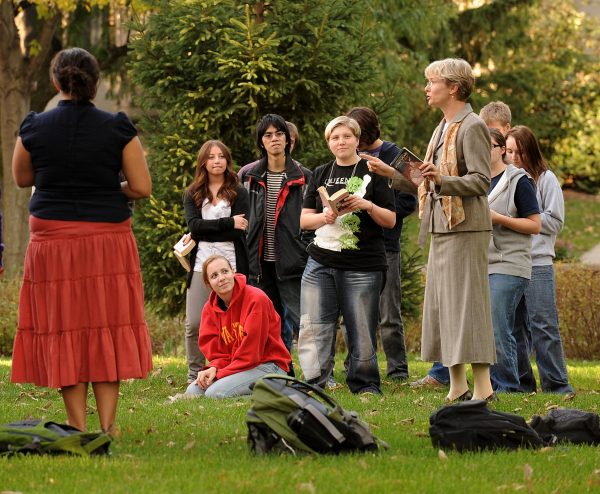MA in English (Specialization in Literature) requires a total of 30 credits of coursework, which can be completed within two academic years of full-time study.
Degree requirements (Effective Fall 2023)
Curricular policies and guidelines
There is no language requirement for this program. However, students planning to pursue a PhD should be aware that most PhD programs require demonstrable skill in one or two foreign languages.
Thesis and creative component options
In your last semester as a master’s student, you will complete a substantial research project—either a traditional thesis or a creative component (see more information here).
Creative component option (portfolio)
The creative component option allows you to apply and display what you’ve learned in your coursework. Students who choose to complete a creative component have the option to produce a portfolio of original scholarly research, one that demonstrates a substantive understanding of key issues in literature and/or film and reflects on their intellectual experiences in the English MA program.
Description
The portfolio must contain three substantially revised and expanded versions of their best work from the English MA program (approximately 15,000 words). These revised projects are to demonstrate students’ ability to successfully build on the work completed in graduate seminars and should represent highly polished works of scholarship. The portfolio should also feature an introduction (approximately 3,000-3,500 words) that reflects on students’ intellectual experiences in the program and how the skills, methodologies, and content that they explored might be helpful to them in the future. The introduction should also introduce and contextualize each of the three projects, discussing both the research and writing of the original work and how it was revised and expanded for the portfolio. Students are encouraged to highlight research methods, critical and theoretical approaches, and key questions that have informed their work in the English MA program as part of their introduction. Students may ask the instructor of a class for which a project was originally created for clarification of that instructor’s original feedback but students should not ask instructors for additional feedback on drafts of portfolio work unless they are a member of the student’s committee.
Timeline
In the first year of their MA program, students who choose to pursue the portfolio option will complete the following steps:
- Choose a Major Professor and POS Committee.
- Submit a prospectus that includes:
- an explanation of the significance or benefits accruing from the project, to them and other relevant parties,
- a brief review of relevant literature related to key themes and questions they plan to explore in their portfolio, and
- a timetable or work schedule for completing the project.
- Review the prospectus with the POS committee, revising as necessary so that it becomes a memorandum of understanding between the student and their POS committee.
Final oral defense of the thesis or creative component (Final Oral Examination)
Students should refer to the above information about creative component options as well as Guidelines for Thesis and Creative Component (MA) as soon as they begin to establish their POS Committee and share their research interests. See the section on Graduation for more details and information on finishing up as well as resources with links to very helpful information.

